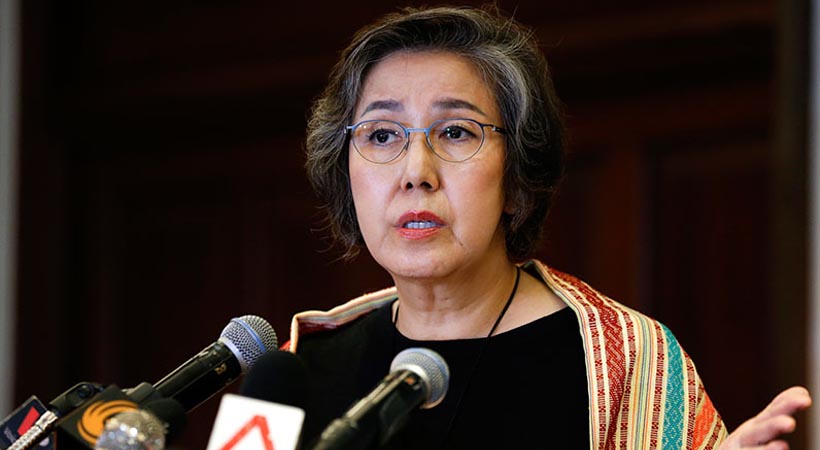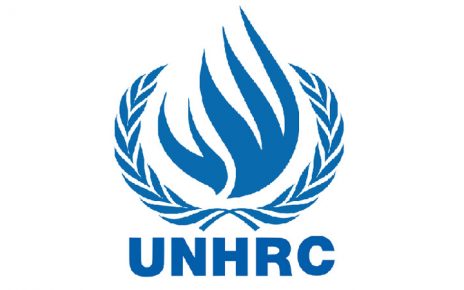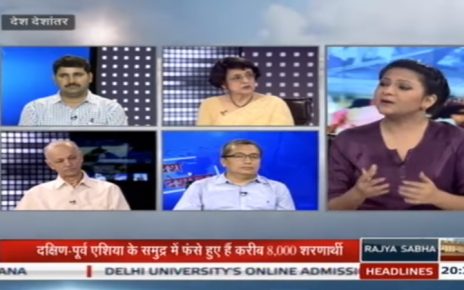H.E. Joaquín Alexander Maza Martelli
President
UN Human Rights Council
C/o-Office of the United Nations High Commissioner for Human Rights (OHCHR)
Palais des Nations
CH-1211 Geneva 10, Switzerland
Email: hrcpresidency@unog.ch
Subject: Seeking your urgent intervention for the removal of UN Special Rapporteur on the situation of human rights in Myanmar Professor Yanghee Lee for blatant violations of the “5/2. Code of Conduct for Special Procedures Mandate-holders of the Human Rights Council”
Excellency,
The Asian Centre for Human Rights (ACHR) is writing to seek your interventions for the removal of Professor Yanghee Lee as UN Special Rapporteur on the situation of human rights in Myanmar for blatant violations of the “5/2. Code of Conduct for Special Procedures Mandate-holders of the Human Rights Council”, in particular, Article 3 – General principles of conduct and Your Excellency’s recent action with respect to the Chairperson of the Fact Finding Missions on Myanmar. While grave human rights violations in Myanmar must be addressed, the same must not be undermined by the bias of the Special Rapporteur.
Your Excellency is fully aware “universality, impartiality, objectivity, and non-selectivity, and the elimination of double standards and politicization” are non-negotiable cornerstones for functioning of the UN Human Rights Council and its mechanisms including the Special Procedures. Once these principles are blatantly violated by a particular mandate holder, continuation becomes untenable.
In this regard, kindly allow the ACHR highlight the standard set by Your Excellency with respect to former Chairperson of the Fact Finding Mission on Myanmar Ms Indira Jaisingh and the need to uphold the same standard with respect to the on the situation of human rights in Myanmar Professor Yanghee Lee.
1. Standard set by Your Excellency with respect to the Chairperson of the Fact Finding Mission on Myanmar
The Human Rights Council through its resolution A/HRC/RES/34/22 dated 24 March 2017 decided to dispatch urgently an independent international fact-finding mission, to be appointed by the President of the Human Rights Council, to establish the facts and circumstances of the alleged recent human rights violations by military and security forces, and abuses, in Myanmar, in particular in Rakhine State.
On 30 May 2017, Your Excellency had appointed Ms. Indira Jaising to serve as Chair of the Fact Finding Mission.
A copy of the Your Excellency’s Statement is appended as Annex-I.
On 27 July 2017, Your Excellency announced new composition of the Fact-finding Mission on Myanmar and appointed Mr. Marzuki Darusman (Indonesia) to serve as a member and Chair instead of Ms Jaisingh.
A copy of the Your Excellency’s Statement is appended as Annex-II.
Though Your Excellency had not provided any reason for the removal of Ms Indira Jaisingh, a U.N. official told Reuters “Jaising agreed to step down after the council president raised concerns about public comments she made that could be seen as indicating bias.” Ms Jaisingh in an interview to Al Jazeera said, “The situation of the Rohingya community in Myanmar is especially deplorable because they face the risk of a genocide.”
A copy the news story, New chairman appointed to U.N. mission probing Myanmar abuses, of Reuters dated 27 July 2017 is appended as Annex-III.
A copy of the news story, UN appoints team to probe crackdown against Rohingyas, ofAljazeera dated 30.05.2017 that carried the interview of Ms Jaisingh is appended as Annex-IV.
2. The case for removal of UN SR on Myanmar based on the standard set by Your Excellency with respect to Chairperson of the Fact Finding Mission on Myanmar
Asian Centre for Human Rights request Your Excellency and the Human Rights Council to examine the blatant violations of the “universality, impartiality, objectivity, and non-selectivity, and the elimination of double standards and politicization” by the UNSR on Myanmar as highlighted below:
2.1. Failure to name and condemn the armed opposition groups of the Rohingyas for killing of ethnic Mros on 3 August 2017
On 3 August 2017, six Mro villagers were killed by the Rohingya armed opposition groups in Rakhine state of Myanmar. It was widely reported that the ethnic Mros who are indigenous peoples and distinctly different from the ethnic Rakhine were killed by the Arakan Rohingya Salvation Army (ARSA).
A copy of the press report is appended as Annex-V.
On 11 August 2017, Prof Lee issued a statement calling upon the Myanmar Government to “must ensure that security forces exercise restraint in all circumstances and respect human rights in addressing the security situation in Rakhine State”. She further stated, “There have been increasing reports of incidents affecting the local population, including the killings of six Mro villagers on 3 August…I share the concern of the Myanmar Government and its people regarding the safety and security of those living in Rakhine State in the light of these incidents.”
Please refer to Annex-VIII for the statement.
It is deeply regrettable that the Special Rapporteur failed to name even the armed opposition groups for the killing of the ethnic Mros. Her statement was so ambiguous that it is impossible to identify whether the ethnic Mros were killed by the Myanmarese government forces or the armed opposition groups.
2.2. Failure to name the communities attacked by the armed opposition groups of the Rohingyas since 25th August 2017
This failure to condemn the perpetrators not only emboldened the armed opposition groups.
Asian Centre for Human Rights believes that the failure on the part of Professor Yanghee Lee to condemn the Rohingya armed group the killing of six Mros on 3rd August 2017 led to the killing of five ethnic Daingnets on 26 August near Kyaungdoe village in Rakhine state and another seven Mro ethnic people during an attack on Khon-Taing Village in Maungtaw Township on 28 August.
Asian Centre for Human Rights sent a communication to the Special Rapporteur on 28th August 2017 requesting specific public statement against the Arakan Rohingya Salvation Army (ARSA) for the attacks on ethnic and religious minorities in Rakhine province of Myanmar and other issues related to the Rohingya crisis.
A copy of ACHR’s email is appended as Annex-VI.
Special Rapporteur Lee issued a statement on 31 August 2017 expressing “alarm at the deteriorating situation in Myanmar’s Rakhine State, affecting not just the Rakhine and Muslim populations but also other communities.”
The failure to name “other communities” i.e. Daignets and Mros is part of the de-recognition of the violations on the ethnic minorities by the Special Rapporteur to highlight only the grave human rights violations on the Rohingyas.
2.3. The pattern of failure to name the armed opposition groups of the Rohingyas by the Special Rapporteur
The following are statements of facts:
- On 9 October 2016, the members of the armed opposition groups launched a surprise attack on the No.1 Border Guard Police Command Headquarters (Kyikanpyin), police outpost at Kotankauk and the Ngakhuya local administrative office. In that incident, 9 policemen were killed and 48 assorted arms, 6624 bullets, 47 bayonets, and 164 bullet cartridges seized by the armed opposition groups.
- On 25 August 2017, members of the armed opposition groups belonging to the Rohingya community launched sneak attacks on 30 police outposts in Maungtaw, Buthidaung and Yathedaung townships as well as against the Regiment Headquarters in Taungthazar village. The Government of Myanmar stated that 10 police officers, one soldier and one immigration officer were killed while nine security officers and a number of civilians were wounded; and six firearms were lost.
Yet, UN Special Rapporteur on the situation of human rights in Myanmar Professor Yanghee Lee has intentionally and purposely failed to name the armed groups formed by members of the Rohingya community in her statements.
The tabular chart below exposes the failure of the Special Rapporteur Professor Yanghee Lee to condemn the Rohingya armed opposition groups and selective approach to other armed opposition groups:
| Title | Date of the Statement | Statement of Ms Yanghee Lee | ACHR’s remarks on preference for the Rohingya |
| Myanmar: Worsening cycle of violence in Rakhine must be broken urgently, UN expert warns | 31.08.2017 | The Special Rapporteur noted concerns over both the extremist attacks which followed the release of the final report by the Rakhine Advisory Commission, led by former UN Secretary-General Kofi Annan, and the major security operations undertaken in response to the attacks. (Annex-VII) | The Special Rapporteur purposely refused to name the origin/community of the “extremist” groups. The reference to “extremist” as made only after Asian Centre for Human Rights questioned her independence and impartiality in an email dated 28 August 2017. |
| Myanmar: UN rights expert urges restraint in security operation in Rakhine State | 11.08.2017 | “I am particularly reminded of the allegations of serious human rights violations which followed security force operations in the aftermath of attacks against three border guard police facilities in Maungdaw and Rathedaung in October and further clashes in November.” “There have been increasing reports of incidents affecting the local population, including the killings of six Mro villagers on 3 August. I share the concern of the Myanmar Government and its people regarding the safety and security of those living in Rakhine State in the light of these incidents.” (Annex-VIII) |
The Special Rapporteur purposely does not mention who carried out “attacks against three border guard police facilities in Maungdaw and Rathedaung in October”. This is despite the fact that it is universally known that the Rohingya armed groups carried out the attack.
The failure to name the perpetrators by the Special Rapporteur is an injustice to the victims. It creates an impression that Mros were killed by the security forces. This is despite the fact that members of the Rohingya armed groups killed ethnic Mros. |
| Myanmar: UN expert lists catalogue of concerns as human rights slide in worsening conflict | 24.07.2017 | “I was particularly dismayed to learn that the situation in northern Shan State is deteriorating, with reports of more conflict, more alleged rights violations by security forces and armed groups, and inadequate assistance for civilians.” (Annex-IX) | The Special Rapporteur refused to name “armed groups” in the Rakhine State. The Special Rapporteur never named the armed groups of the Rohingyas for alleged human rights violations as she did for the armed groups in the Shan State. |
| End of Mission Statement by Special Rapporteur on the situation of human rights in Myanmar | 21.07.2017 | “However, there is also a reported increase in forced recruitment and abductions by the several Ethnic Armed Groups operating in the region as well as various militias. Civilians are caught between parties to the conflict facing abuses, risks from mines and clashes while less able to access assistance” (with respect to Tatmadaw). (Annex-X) | The Special Rapporteur has no hesitation to name “Ethnic Armed Groups”. She has consistently refused to use the term armed groups with respect to the Rohingyas. |
| Statement by Ms. Yanghee LEE, Special Rapporteur on the Situation of Human Rights in Myanmar at the 35th session of the Human Rights Council | 15.06.2017 | In Shan and Kachin States, unacceptable reports of serious human rights violations allegedly committed by several parties to the conflict including the Tatmadaw and ethnic armed groups have continued to arise. (Annex-XI) | Once again, the Special Rapporteur has no hesitation to name “Ethnic Armed Groups”. She has consistently refused to use the term armed groups with respect to the Rohingyas. |
| Statement by Ms. Yanghee LEE, Special Rapporteur on the Situation of Human Rights in Myanmar at the 34th session of the Human Rights Council | 13.03.2017 | As you are all likely aware the situation in the state took on new dimensions on 9 October, when three Border Guard Police facilities were reportedly attacked, by groups of armed men in a coordinated manner, killing 9 members of the Myanmar Police Force. (Annex-XII) | The Special Rapporteur always uses “ethnic” before the armed groups of the ethnic communities. However, with respect to the Rohingya, the Special Rapporteur (i) does not use “armed group” but “armed men in a coordinated manner” to insinuate that there is no armed group of the Rohingyas and (ii) of course does not use term like “ethnic” to describe the armed groups of the Rohingyas. |
| UN expert urges action to protect Rohingya population in Myanmar | 27.02.2017 | Speaking at the end of a four-day visit to Dhaka and Cox’s Bazar Yanghee Lee said: “the magnitude of violence that these families have witnessed and experienced is far more extensive than I had originally speculated.” During her visit, she met members of the Rohingya population who had fled to Bangladesh after 9 October 2016 when the Myanmar Border Guard Police facilities were attacked and reprisals followed. “We all owe it to those I have met and their fellow community members to do everything in our power to ensure this is done and to give the Rohingya people reason to hope again,” she concluded. (Annex-XIII) |
There is no reference to who carried out the attacks on 9 October. |
In addition to the above tabular chart, the Special Rapporteur further issued “End of Mission Statement by Special Rapporteur on the situation of human rights in Myanmar” on 24 February2017, press statement “Cox’s Bazar: UN Special Rapporteur on Myanmar to visit Bangladesh – 20 to 23 February on 17 February 2017, “End of Mission Statement by Special Rapporteur on the situation of human rights in Myanmar” on 23.01.2017, press statement “Myanmar: UN expert warns of worsening rights situation after “lockdown” in Rakhine State” on 18 November 2016, press statement “International community must not lose sight of Myanmar challenges, UN expert warns” on 28 October 2016 and press statement “UN experts urge Myanmar to address serious violations of human rights in northern Rakhine State” on 24 October 2016. All these statements can be accessed at:
http://www.ohchr.org/en/NewsEvents/Pages/NewsSearch.aspx?MID=SR_Myanmar
In none of these Statements Special Rapporteur Lee mentioned “armed groups” or “armed opposition groups” of the Rohingyas. The failure to mention “armed groups” or “armed opposition groups” of the Rohingyas in all the statements is not a mere co-incidence but an informed decision arising out of the biases of the Special Rapporteur.
ACHR states that the bias of the Special Rapporteur towards the armed opposition groups of the Rohingyas has emboldened the Rohingya armed groups to attack non- Rakhine ethnic minorities like Mros and Diagnets who are also known as the Chakmas. This bias of the Special Rapporteur indeed encourages terrorism which the UN Security Council has been grappling with and indeed, causes serious damage to the suffering of the Rohingyas. The fact that Rohingya armed groups do exists as the ethnic armed groups cannot be denied.
3. Request for actions for removal of the Special Rapporteur on the situation of human rights in Myanmar Professor Yanghee Lee
The State (Myanmar) undoubtedly has the responsibility to ensure the respect for human rights for all people under its jurisdiction. It does not necessarily mean that the Special Rapporteur shall condone, overlook and undermine the human rights abuses by the non-State actors including those formed by persons belonging to the Rohingya community.
If Indira Jaising’s statement was considered as “indicating bias” for having made the same prior to the investigation, the failure to condemn the Rohingya armed opposition groups even after repeated visits and credible reports by Special Rapporteur Ms Lee too must be consideredas “bias”.
The United Nations Human Rights Council simply cannot allow continuation of a Special Rapporteur who refuses to name the armed opposition group and effectively treats them so piously that they cannot be named for the human rights abuses. The UN mechanisms condemned violations the Islamic State, Taliban and other armed opposition groups based on the primary and secondary sources of information. It is only in the case of the Rohingya armed opposition groups that the Special Rapporteur has refused to name the armed opposition against the evidence on record – the attacks and killings of Myanmarese security forces and innocent non-Rohingya civilians.
The UN Human Rights Council must continue to examine human rights violations by the Burmese security forces. However, it must be borne in mind that a Rapporteur who has proven biases does not add credence in any manner.
In the light of the incontrovertible facts placed on record through this communication and standards set by Your Excellency with respect to Chairperson of the Fact Finding Mission on Myanmar, Asian Centre for Human Rights fervently requests Your Excellency to take all necessary measures to remove Ms Yanghee Lee as the Special Rapporteur on the situation of human rights in Myanmar during the forthcoming 36th Session of the UN Human Rights Council.
In our considered view, the Special Rapporteur has brought disrepute to the mandate, caused enormous harm to the reputation of the United Nations Human Rights Council and of course, harmed the suffering of the Rohingyas who have nothing to do with armed opposition groups formed by the members from their community.
The Special Procedures mandate holders must not selectively address the issue of terrorism and terrorist organizations.
With kind regards,
Yours sincerely
Paritosh Chakma
Director
Encl: As above
Copy to:
1. Members of the Bureau HRC
2. Coordinators of the Regional Groups of the UNHRC
3. Members of the UN Human Rights Council
4. Observer Member States of the UN Human Rights Council
5. Other Special Procedures mandate holders
6. Non-governmental organizations in Consultative Status with the UN ECOSOC



